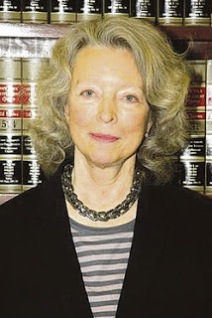When Judge Kristen Booth Glen walked into her Manhattan Surrogate’s courtroom one day in 2007, she had no idea she was about to challenge the nation’s top banks on behalf of tens of thousands of disabled people.
Before her stood lawyer Harvey J. Platt, who was petitioning to become the legal guardian of Mark Christopher Holman, a severely autistic teen who lived in an institution upstate.
Holman had been left an orphan nearly three years earlier after the eccentric millionaire who adopted him passed away. According to doctors, he had the communication skills of a toddler, unable to bathe, dress, or eat by himself.
But before Judge Glen would grant this seemingly perfunctory petition, she had a few questions for Platt.
“How often have you visited Mark Holman?” she asked the lawyer.
“Since his mother died, I have not visited him,” said Platt.
“And when you say you haven’t visited him since then, how often had you visited him prior to that?”
“I haven’t seen him since he was eight or nine,” responded the lawyer. “His mother used to bring him to our office with his brother, just to show him my face and so forth and so on, so I haven’t seen him probably since 1995 or 1996.”
It was around that time that Platt helped Mark’s mother, Marie Holman, draft her will and create trusts for him and his older brother. A decade later, when she was dying, Platt promised Marie he’d apply to become Mark’s guardian.
“And have you visited the institution which he currently resides in?” Glen asked.
“No, I intend to, but I have not as yet,” Platt said, sounding weary. “I don’t think even a visit has much significance anyway. He’s totally nonverbal—he’s never spoken a word. He’s potentially aggressive.”
This didn’t sit well with Judge Glen. When it came to signing away the rights of disabled people to guardians, she was perhaps the most cautious judge in New York. But what came next would floor her.
Platt informed her that Mark’s trust had reached nearly $3 million. But while his trustees—Platt and JP Morgan Chase—had collected thousands of dollars in commissions, they hadn’t spent a penny on Mark. Medicaid covered his basic care at the institution upstate, but neither the lawyer nor the bank had considered how his mammoth trust might further aid his quality of life.
“Whether there is a cure for his autism or not, the question is: Are there things that could make his life more pleasurable or fulfilling?” Glen asked. “If somebody took him out to the movies once a week, or somebody took him out to lunch, or what he really likes to do is watch football—I don’t know. There’s always something that could make people happier, and I don’t think you could know that without really visiting him and knowing what’s going on.”
As she spoke, Glen could not have predicted that the case would become a five-year obsession for her. Or that she was about to disrupt a lucrative trade in which some trustees sponge commissions off wealthy disabled people—while doing little to enhance their care.
“They’re lazy pieces of shit,” says Glen. “It’s a business. They collect their commissions, and they think their only responsibility is to invest the money and keep the money safe with no regard for the beneficiary.”
Full Article and Source:
The Ruling That Could Change Everything for Disabled People With Million-Dollar Trusts







